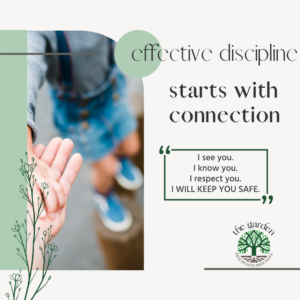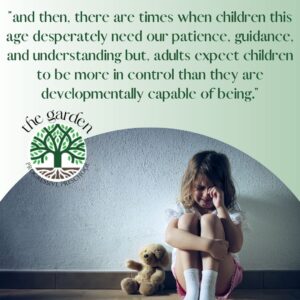
if I could only share one thing with parents and early educators, it would be this. if we want children to respect us, trust us, listen to us and respond to us, we have to do all of that for them, too. i use the word “discipline” loosely because i’m not sure that best describes what children need in order to truly thrive in their environment (and thriving is the goal, rather than submission).
connecting with children is expected of parents but sometimes gets dismissed by educators, who may see their role as just someone there to put knowledge into a child’s brain. Or, in a non-academic/daycare or babysitter type setting, as someone who is there simple to make sure no one gets hurt.
teachers and caregivers of all kinds should always be engaging and connecting with the children in their care. when a child is new to an environment or caregiver, this is especially important. connecting with a child means Learning what they love (dinosaurs? puppies? big brother?), talking to them about their unique interests and discoveries, asking them, and taking a genuine interest in their lives. but, it doesn’t stop there. children need to hear and feel that connection. finding a special book, song, game, or toy they will love and showing it to them with enthusiasm, or even just letting them know how special they are as often as possible. in a group setting, it’s important to Do this for EACH child, especially the child who is struggling to “Follow directions,” for that is the child who is showing us that their needs are not yet met.
This is THE most important thing you can do as a caregiver and will go so far in preventing disruptive and unsafe behaviors because, at the core of these bonds, what we are building when we do these things is trust.
but we must not expect a child to give us their trust without also offering them ours in return. knowing what children are capable of and offering them opportunities to practice these things is part of showing them they are trusted. here are some examples of things that even toddlers can be trusted to do, but often are not:
~know when they are hungry, how much to eat, serve and feed themselves
~produce beautiful and unique art without guidance
~dress themselves, assist in diaper changes
~prepare food, bake, and cook with minimal guidance
~assess risk and use caution while playing
(the list goes on!)
and then, there are times when children this age desperately need our patience, guidance, and understanding but adults expect children to be more in control than they are developmentally capable of being. here are some examples of things that young children are not equipped to handle without guidance:
~sharing with peers
~communicating clearly when upset
~paying close attention to someone talking to them for more than a minute or so
~being decisive
~sitting/standing still for more than a few seconds
~knowing the difference between real and imaginary
~having control over their fears and emotions
~understanding rules/consequences that aren’t logical
(this list goes on, too, but you get the idea!)

in these instances, it is important to connect to that struggling child so that they can trust us to guide them through it. if we have earned the respect of a child and shown it in return, perhaps a direction such as “please let your friend know that they can have a turn when you are finished,” won’t seem like an aggression, and the child will not need to put up their defenses. or, when you have to explain that pushing someone isn’t okay, they will understand that it is because you are there to keep them safe, not because you’re trying to assert your authority or control them. when children have autonomy, respect, and trust given to them, they don’t spend all of their time trying to find it in the ways that we often hear of when we hear about “difficult children.”
will there still be challenges? absolutely. everyday. and these are possibly the times when we can best show that we know and trust the children in our care. if we have invested the time to learn what a child needs, we will know exactly what to offer in a moment of disappointment, frustration, or sadness. whether it’s a hug, guidance, some encouraging words, or just some space — showing the child we respect and accommodate their needs; especially when they are struggling.
so, i have a challenge to all of you out there caring for children in any capacity: find a way, every day, to tell or show each child this:
i see you
i know you
i respect you
and, most importantly,
I WILL keep you safe.
and if you really mean it, the rest will fall into place. i promise.
~e
